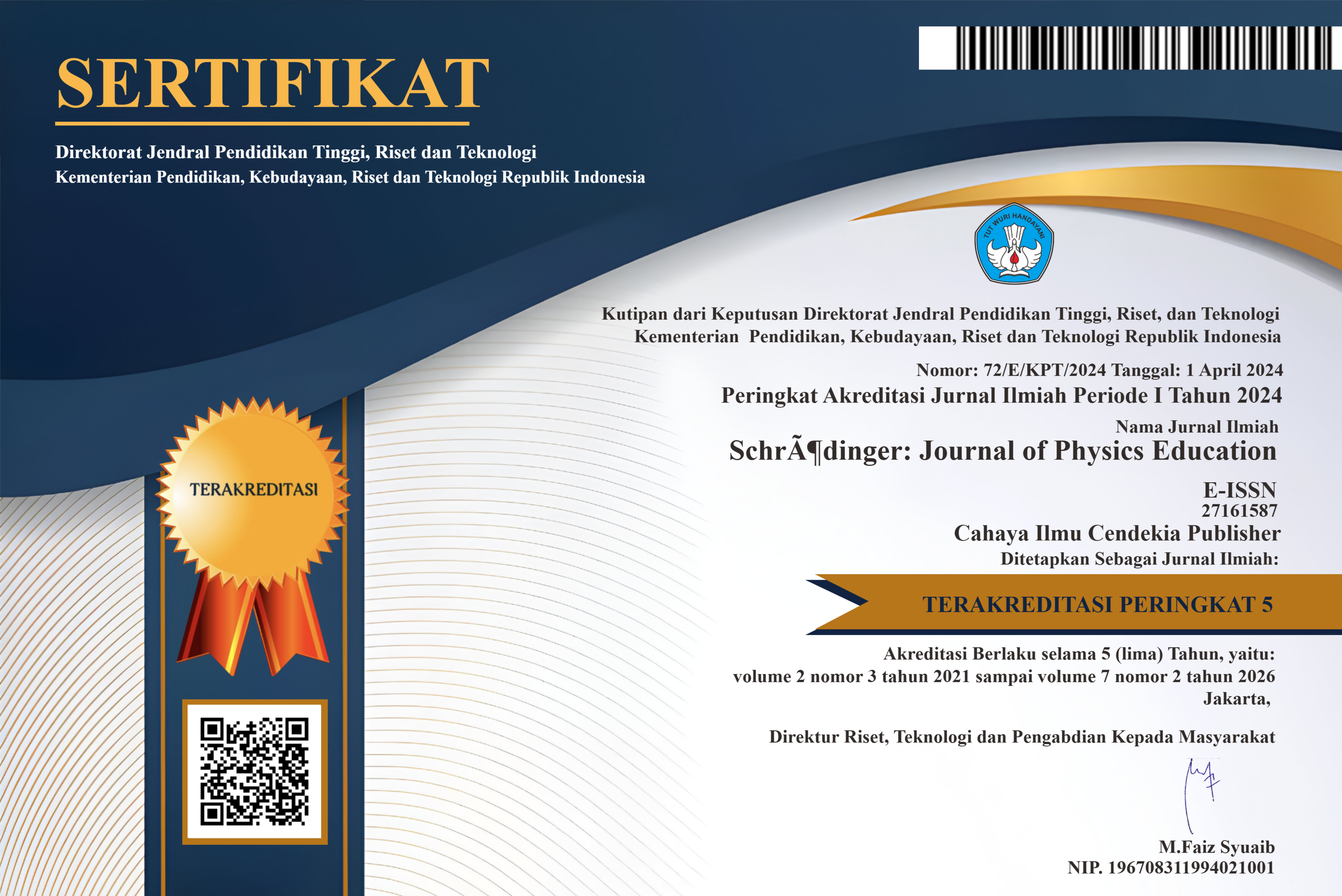A Study of Student Science Process Skills: In Formal Change Practices
Abstract
Research Objectives: This study aims to describe students' science process skills in the transformation practicum using an m-module based manual.
Methodology: This study used a descriptive qualitative approach involving 40 physics education students at Jambi University. The sampling technique used is total sampling. The data collection instrument used the observation sheet of science process skills. The science process skills that are focused are basic science process skills, namely communication and measuring as well as integrated science process skills making graphs and describing relationships between variables.
Main Findings: The results of this research were Jambi university physics education students who had good science process skills, especially measurement skills, 65% of the 40 students were in the very good category. This is also influenced by the effective use of e-modules and m-modules that are attractive to students.
Novelty/Originality of Research: The effectiveness of the use of the m-module is seen in the good basic abilities of students in the practice of changing forms. Therefore, basic science process skills influence the development of integrated science process skills, where communication and measurement skills are part of basic science process skills.
References
M. Andayani, “E-Modul Fisika Dasar I Berbasis 3D Pageflip Professional”, Sch. Jo. Phs. Ed, vol. 1, no. 2, pp. 44-47, May 2020.
Maison, M. D. W. Ernawati, R. S. Budiarti, W. Kurniawan, Y. Ningsih, T. O. Puspitasari, N. Jannah, and D. S. Putra, “Learning In Nature Science: Social Implications, Normality Of Scientist, Attitudes Towards Investigation Of Natural Science, And Interest Adds To Science Learning Time”, International Journal Of Scientific & Technology Research, vol. 8, no. 12, pp. 1478-1484, 2019.
H. Harizon, H. Haryanto, and A. Anisah, “Pengaruh Penerapan Model Pembelajaran Kooperatif Tipe Make-A Match Terhadap Hasil Belajar Siswa pada Materi Larutan Elektrolit dan Nonelektrolit di SMA PGRI 2 Kota Jambi”, jisic, vol. 8, no. 2, pp. 47-56, Dec 2016.
T. Tanti, U. Rahim, and H. Samparadja, “Pengaruh Model Problem Based Learning Terhadap Kemampuan Pemecahan Masalah Matematis Siswa Kelas VII SMP Negeri 14 Kendari”, Jurnal Penelitian Pendidikan Matematika, vol. 8, no. 2, pp. 169-182, 2020.
M. Naswir, H. Haryanto, and F. Wati, “Analisis Keterlaksanaan Model Pembelajaran Inkuiri Terbimbing untuk Materi Sifat Koligatif Larutan dan Pengaruhnya Terhadap Kemampuan Berpikir Kreatif Siswa Kelas XII IPA SMA Islam Al-Falah Kota Jambi”, jisic, vol. 9, no. 2, pp. 43-51, Dec 2017.
J. Juita, “Identifikasi Konsentrasi Belajar di SMAN 8 Kota Jambi”, Sch. Jo. Phs. Ed, vol. 1, no. 1, pp. 24-29, Jan. 2020.
Astalini, D.A Kurniawan, R. Perdana dan H. Pathoni. “Identifikasi Sikap Peserta Didik terhadap Mata Pelajaran Fisika di Sekolah Menengah Atas Negeri 5 Kota Jambi”, Unnes Physics Education Journal, vol. 8, no. 1, pp. 34-43, 2019.
Darmaji, D.A. Kurniawan, and A. Suryani. “Effectiveness of Basic Physics II Practicum Guidelines Based On Science Process Skills”. Jurnal Ilmu Pendidikan Fisika, vol. 4, no. 1, pp. 1-7, 2019.
A. Astalini, M. Maison, M. Ikhlas, D.A. & Kurniawan. The Development of Students Attitude Instrument Towards Mathematics Physics Class. Edusains, vol.10, no.1, pp.46-52, 2018.
U. Sulistiyo, A. Mukminin, K. Abdurrahman, and H. Haryanto, “Learning to teach: A case study of student teachers' practicum and policy recommendations”, The Qualitative Report, vol. 22, no. 3, pp. 712 -731, 2017.
Darmaji, Astalini, P. Armandita, dan Maison. “Penuntun Praktikum Viskositas Berbasis Keterampilan Proses Sains Menggunakan Model Discovery Learning”, Universitas Jambi.
N. I. Haq, “Pengembangan Worksheet Materi Gelombang Berbasis Keterampilan Proses Sains ”, Sch. Jo. Phs. Ed, vol. 1, no. 2, pp. 48-53, May 2020.
Maison, Darmaji, Astalini, D.A. Kurniawan, and P.S. Indrawati. “Science Process Skills And Motivation”. Humanities & Social Sciences Reviews, vol. 7, no. 5, pp. 48-56, 2019.
U. Lestari, Astalini, dan Darmaji. “Deskripsi Keterampilan Proses Sains Mahasiswa Pendidikan Fisika Universitas Jambi Pada Kegiatan Praktikum Fisika Dasar I”, Universitas Jambi, pp. 1-10.
Darmaji, D.A. Kurniawan, H. Parasadila, and Irdianti. “Description of Science Process Skills’ Physics Education Students at Jambi University in Temperature and Heat Materials”. The Educational Review, USA, vol. 2, no 9, pp. 485-498, 2018.
Darmaji, Astalini, A. Rahayu, dan Maison. “Pengembangan Penuntun Praktikum Fisika Berbasis Keterampilan Proses Sains Menggunakan Model Problem Solving”. EDUSAINS, vol. 10, no. 1, pp. 83-96, 2018.
Darmaji, D.A. Kurniawan, H. Parasdila, dan Irdianti. “Deskripsi Keterampilan Proses Sains Mahasiswa pada Materi Termodinamika”. Berkala Ilmiah Pendidikan Fisika, vol. 6, no. 3, pp. 345-353, 2018.
H. Harlis and R. S. Budiarti, “Pengembangan Bahan Ajar Praktikum dan Instrumen Penilaian Berbasis Keterampilan Proses Sains pada Mata Kuliah Mikologi Program Studi Pendidikan Biologi Universitas Jambi”, BIO, vol. 3, no. 2, pp. 102 - 112, Dec. 2017.
Astalini, Darmaji dan P.S. Indrawati. “Pengembangan Penuntun Praktikum Fisika Dasar I Berbasis KPS dan PBL Pada Materi Kerapatan”, Universitas Jambi.
H. Harlis and R. S. Budiarti, “Pengembangan Buku Ajar Alga pada Mata Kuliah Taksonomi Monera dan Protista Bagi Mahasiswa Pendidikan Biologi”, BIO, vol. 5, no. 3, pp. 215-224, Dec. 2019.
H. Harlis and R. S. Budiarti, “Development of Appypie-based Android Application as a Learning Media about Alga in Monera and Protista Course for Students Majoring in Biology Education”, BIO, vol. 4, no. 2, pp. 114-120, Dec. 2018.
Darmaji, D.A. Kurniawan, Astalini, and N.R. Nasih. “Persepsi Mahasiswa pada Penuntun Praktikum Fisika Dasar II Berbasis Mobile Learning”. Jurnal Pendidikan, vol. 4, no. 4, pp. 516-523, 2019.
Astalini, Darmaji, W. Kurniawan, K. Anwar, and D. A. Kurniawan. “Effectiveness of Using E-Module and E-Assessment”. iJIM, vol. 13, no. 9, pp. 21-39, 2019.
Asrial, Syahrial, D. A. Kurniawan, F. Chan, R. Septianingsih, dan R. Perdana. “Multimedia Innovation 4.0 in Education: E-Modul Ethnoconstructivism”. Universal Journal of Educational Research, vol. 7, no.10, pp. 2098-2107, 2019.
Darmaji, D. A. Kurniawan, Astalini, A. Lumbantoruan, and S. C. Samosir. “Mobile Learning in Higher Education for The Industrial Revolution 4.0: Perception and Response of Physics Practicum”. iJIM, vol. 13, no. 9, pp. 4-20, 2019.
R. Darmawangsa, Astalini, dan D.A. Kurniawan. “Pengembangan Instrumen Sikap Siswa Sekolah Menengah Atas terhadap Mata Pelajaran Fisika”. Jurnal Pendidikan Fisika, vol. 6, no.1, pp. 107-114.
M. A. Gumilang, S. Patmanthara, dan D. D. Prasetya. “Pengembangan Modul Praktikum Interaktif Pada Pemrograman Berbasis Web”. Prosiding SENTIA, vol. 8, pp. 213-219, 2016.
Syamsurizal, H. Haryanto and N. Chairani, “Pengembangan e-Modul Berbasis Keterampilan Proses Sains pada Materi Kesetimbangan Kimia untuk Tingkat SMA”, SEMIRATA, pp. 655 – 661, 2015.
T. Tanti, “Konstruksi dan Validasi Bahan Ajar Fisika Berbasis Problem-Based Learning (PBL) untuk Meningkatkan Keterampilan Generik Siswa”, Journal of Teaching and Learning Physics, vol. 5, no.1, pp. 28-34, 2020.
T. Tanti, M. Maison, A. Mukminin, S. Syahrial, A. Habibi, and S. Syamsurizal, “Exploring The Relationship Between Preservice Science Teachers’beliefs and Self-Regulated Strategies of Studying Physics: A Structural Equation Model”, Journal of Turkish Science Education, vol. 15, no. 4, pp. 79-92, 2018.
D. D. Romadona and D. Adila, “Analisis Kemampuan Berpikir Kritis Siswa SMA Pada Materi Gerak Harmonik Sederhana”, Sch. Jo. Phs. Ed, vol. 1, no. 2, pp. 59-66, May 2020.
T. Tanti, J. Jamaluddin, and B. Syefrinando, “Pengaruh Pembelajaran Berbasis Masalah terhadap Beliefs Siswa tentang Fisika dan Pembelajaran Fisika”. Jurnal Ilmiah Pendidikan Fisika Al-Biruni, vol. 6, no.1, pp. 23-36, 2017.
Astalini, D. A. Kurniawan, dan L. R. Sholihah. “Deskripsi Sikap Siswa SMA Negeri Pada Mata Pelajaran Fisika”. EDUSAINS, vol. 10, no. 1, pp. 160-167, 2018.
T. Tanti, D. A. Kurniawan, R. Perdana, and O. H. Wiza, “Comparison Of Student Attitudes Toward Natural Sciences In Rural Middle Schools In Jambi Province”, Ta'dib, vol. 23, no. 1, pp. 63-74, 2020.
Darmaji, D. A. Kurniawan, and Irdianti. “Physics education students’ science process skills”. International Journal of Evaluation and Research in Education, vol. 8, no. 2, pp. 293-298, 2019.
L. Kartina and S. Subani, “Analisis Kemandirian Siswa MTS pada Mata Pelajaran IPA”, Sch. Jo. Phs. Ed, vol. 1, no. 1, pp. 30-35, Jan. 2020.
A. R. Putri, Maison, dan Darmaji. “Kerjasama dan Kekompakan Siswa dalam Pembelajaran Fisika di Kelas XII MIPA SMAN 3 Kota Jambi”. Jurnal Edufisika, vol. 3, no. 2, pp. 32-40, 2018.
E. Anggereini, R. S. Budiarti, and M. E. Sanjaya, “The Effect of ICT-based Classwide Peer Tutoring (CWPT) Application and Motivation to Biology Education Student Creativity in ICT Learning”, BIO, vol. 4, no. 2, pp. 105-113, Dec. 2018.
H. Haryanto, H. Harizon, and N. Kumala Ratih, “Pengembangan Instrumen Penilaian Keterampilan Proses dan Sikap Ilmiah pada Materi Termokimia Kelas XI MIA SMA Negeri 10 Kota Jambi”, jisic, vol. 8, no. 1, pp. 50 -62, Jan. 2016.
P. Turiman, J. Omar, A. M. Daud, and K. Osman. “Fostering the 21st century skills through scientific literacy and science process skills”. Procedia-Social and Behavioral Sciences, vol. 59, pp. 110–116, 2012.
N. Susanti dan H. Pathoni. “Penerapan Pembelajaran Sains Menggunakan Eksperimen Laboratorium Sebagai Upaya Meningkatkan Pemahaman Konsep Optik di MAN Kota Jambi dan MAN Sungai Gelam”. Jurnal Pengabdian pada Masyarakat, vol. 31, no. 2, pp. 38-47, 2016.
Darmaji, D.A. Kurniawan, Astalini, W. Kurniawan, K. Anwar and A. Lumbantoruan. “Students’ perceptions of electronic’s module in physics practicum”. Journal of Education and Learning, vol. 13, no. 2, pp. 288-294, 2019.
R. Kustijono, B. Jatmiko, and M. Ibrahim. “The Effect Of Scientific Attitudes Toward Science Process Skills In Basic Physics Practicum By Using Peer Model”. International Journal Of Geomate, vol. 15, no. 50, pp.82–87, 2018.
Copyright (c) 2023 Rinjani Rinjani, Dinda Desma Romadona

This work is licensed under a Creative Commons Attribution-NonCommercial 4.0 International License.
Authors who publish with this journal agree to the following terms:
- Authors retain copyright and acknowledge that the Schrödinger: Journal of Physics Education is the first publisher licensed under a Creative Commons Attribution 4.0 International License.
- Authors are able to enter into separate, additional contractual arrangements for the non-exclusive distribution of the journal's published version of the work (e.g., post it to an institutional repository or publish it in a book), with an acknowledgment of its initial publication in this journal.
- Authors are permitted and encouraged to post their work online (e.g., in institutional repositories or on their website) prior to and during the submission process, as it can lead to productive exchanges and earlier and greater citation of published work.






.png)
.png)








.png)
.png)
.png)







